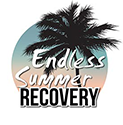

Treatment Services
- Substance Abuse Assessments
- Treatment Planning
- Life Skills
- Yoga and Mindfulness
- Art Therapy
- Nutrition Education
- Relapse Prevention


Treatment Focus
In an environment of structure, safety and support, Endless Summer Recovery’s team helps clients to truly invest in the treatment process…a process that addresses:
- Addiction Education
- Depression/Anxiety
- Anger/Stress Management
- Life Transitions
- Self Discovery
- Codependency
- Twelve Step Recovery
- Compulsive Behavior
Addiction Treatment Modalities
Working with the client, Endless Summer Recovery’s compassionate team creates an individual plan in which the client always comes first…a plan that includes these treatment modalities:
Group Therapy
Throughout the day, our clients meet in different groups together. This allows the client to interact with the rest of the community and begin to develop the skill of getting help from other people that are in recovery. Also, group therapy is essential in the treatment process, because it gives the client something and someone to relate to. While establishing a relationship with their therapist is important, many times it is most helpful for a client to hear how their peers feel and what they are doing to overcome those problems. Group therapy and the client community are fundamental in the early recovery process. Addiction is usually centered on isolation. Group therapy enforces the fact that you are not alone in the way you feel. Experiential groups such as yoga, art and music therapy are some of the groups that our patients will participate in.
Individual Therapy
Each client is assigned a therapist to manage their treatment plans, aftercare plans, and other circumstances, such as family relationships, legal issues, and contacting employers. Many of our staff and therapists are in recovery themselves or are recovering family members, giving them the necessary understanding and knowledge of the 12-steps, which they utilize when caring for clients. Their recovery allows for the empathy and personal experience to be passed on in a one-on-one setting, where the client can feel safe in a private environment. Individual therapy is beneficial for a multitude of reasons. While engaging in individual therapy, you will begin to establish a relationship with your primary therapist. By doing so, you will learn the value of building relationships, creating healthy boundaries and most importantly, the importance of learning to trust another person which is all crucial to the recovery journey. It also allows for you to discuss issues you may not feel comfortable talking about in a group setting. There are often underlying issues that need to be confronted in order to have a successful recovery. Those circumstances can include a number of things, but some may include grief or trauma. In addition, individual therapy is helpful for those who are suffering from a dual diagnosis – someone who is suffering a mental illness in addition to a drug/alcohol addiction. That’s because a disease such as depression or bipolar disorder needs special treatment that is separate from counseling for addiction treatment.
Family Therapy
Family therapy helps the members of a family unit heal and recover as a group. The therapeutic setting provides a safe space for everyone to learn how to adjust to a loved one’s recovery from addiction and mental illness. Family therapy sessions are also designed to help family members make specific, positive changes to improve the home environment as well as heal relationships within the family unit. Family therapy typically involves the client and at least one other member of the family. This could be a spouse, parent, significant other, sibling or any other individual who has a close relationship with the person in treatment.
